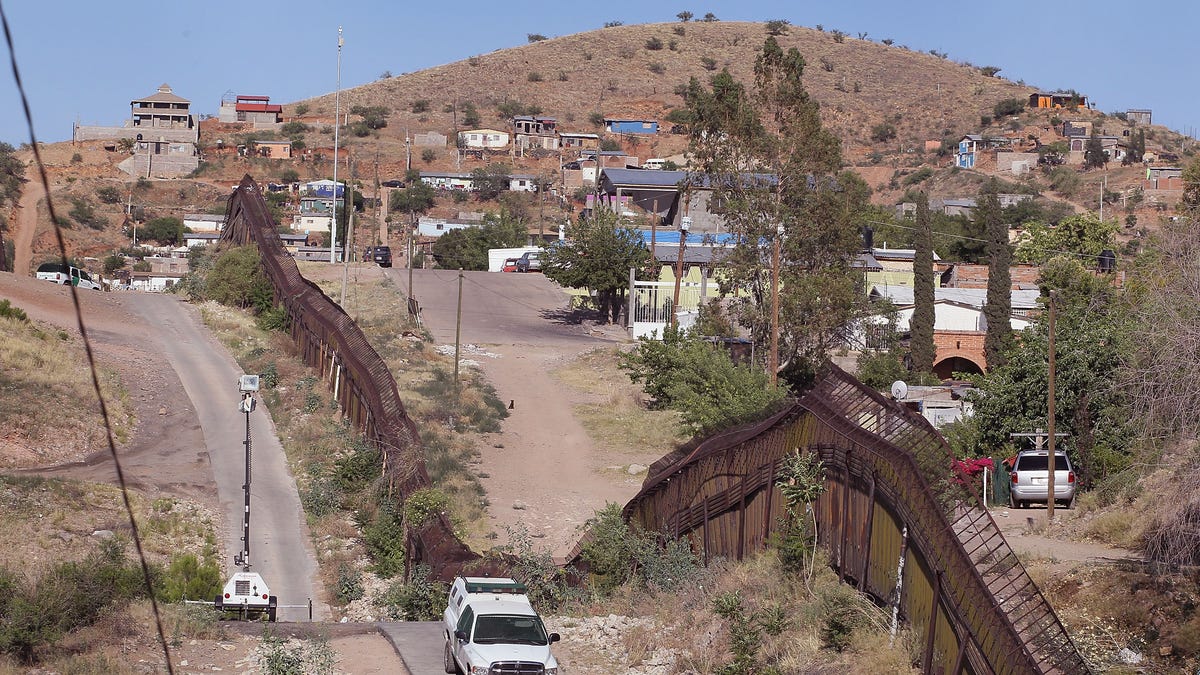
NOGALES, AZ - JUNE 02: A U.S. U.S. Customs and Border Protection agent drives along a fence which separates the cities of Nogales, Arizona and Nogales, Sonora Mexico, a frequent crossing point for people entering the United States illegally, June 2, 2010 in Nogales, Arizona. During the 2009 fiscal year 540,865 undocumented immigrants were apprehended entering the United States illegally along the Mexican border, 241,000 of those were captured in the 262 mile stretch of the border known as the Tucson Sector. (Photo by Scott Olson/Getty Images) (2010 Getty Images)
When vandals scrawled the words “Rape Mexico” on the glass doors of the Lincoln United Methodist Church in Chicago's Pilsen neighborhood, it was hard for the mostly-Latino parishioners not to think of Donald Trump’s famous speech about rapists crossing the border.
But the idea of “raping” Mexico – either for revenge or profit – has a much longer history than modern Trumpian grievances. Intimations of sexual violence have played a major role in aggressive feelings against Mexico for more than five hundred years, and the hyper-masculine posturing of this presidential campaign is tapping into a dark channel of the Mexican national subconscious.
It is no wonder, then, that Mexicans are disgusted by Donald Trump’s fantasy of building a border wall and making Mexico pay for it, a suggestion with echoes of blaming the victim for her own rape.
No other figure embodies this history more than the possibly-unwilling mistress of Hernán Cortés, who was known as Doña Marina, or more infamously as La Malinche.
Nobel Prize winning poet and essayist Octavio Paz called Malinche the violated, traitorous mother of Mexico. Her alliance with Cortés is often cited as an original sin, and the symbolic curse of the Mexican nation. According to Paz, Mexicans call themselves “los hijos de la Chingada”—the children of the raped woman.
The word “malinchismo” refers to someone who is selling out the political and economic interests of the Mexican nation. Malinche has come to represent a pattern of violence for which the victim is held up for blame, a consistent theme in sexual violence across the globe.
- Units that let men scale border fence ‘did what they’re supposed to,’ feds say
- Trump reveals border wall funding plan, draws jeers from Obama
- For many in Mexico, billions of dollars in remittances from U.S. are financial lifeline
- La Santa Muerte: Underworld Saint Goes North of the Border
- A Kinder, Gentler Approach to the Border
During the era of Manifest Destiny and the U.S. war against Mexico in the mid-1840s, President James K. Polk portrayed this war of territorial expansionism as a defense against Mexican belligerency. In his speech to the Congress, President Polk said that war “exists by the act of Mexico herself.”
As U.S. troops marched southward, they pillaged many Mexican villages, raped women, and killed innocent civilians. Soldier, writer, and painter Samuel Chamberlain described the bloody massacre in a cave just outside Saltillo, where a group of Arkansas volunteers murdered and scalped scores of local men, while women and children watched and wailed helplessly in horror. These atrocities were committed as reprisals against Mexican guerrilla attacks – literally "Rape Mexico" – and the perpetrators cheerfully blamed the victims.
More recently, economic expansion and globalization at the U.S.-Mexico border have set the conditions for more acts of sexual violence against women. The hundreds of unsolved murders of female factory workers in Juarez have occurred in an industrialized zone that sees rampant levels of social inequality, labor exploitation, drug and human sex trafficking.
What is undeniable is that free trade agreements like NAFTA have destabilized the Mexican economy and compelled men and women to migrate to and across the border in search of employment. Many encounter rape and death along the way.
It is no wonder, then, that Mexicans are disgusted by Donald Trump’s fantasy of building a border wall and making Mexico pay for it, a suggestion with echoes of blaming the victim for her own rape. “We have the moral high ground here, and all the leverage,” Trump said. “It is time we use it.”
My students sometimes ask me how Malinche could be considered both a victim and a traitor. I point out that this is a common characterization of women who suffer sexual violence — “She asked for it!” Those who scrawled “Rape Mexico” on the doors of a church are saying far more than they realize, and the words are perceived in atavistic ways that are even more ugly than the surface meanings.
